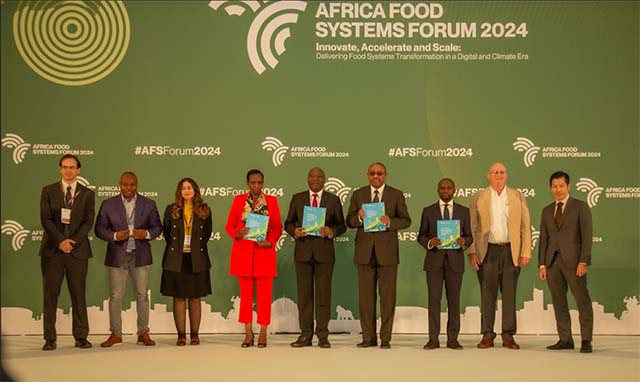
MSMEs highlighted as a force in building Africa’s food systems in latest leading agriculture report
Kigali, Rwanda | THE INDEPENDENT | The Alliance for a Green Revolution in Africa (AGRA) has launched its 2024 Africa Agriculture Status Report that highlights the transformative role of micro, small, and medium-sized enterprises (MSMEs) in shaping Africa’s agrifood landscape. It is titled “Harnessing the Private Sector for Food Systems Transformation in Africa.”
“By harnessing the power of the private sector, we can drive meaningful food systems transformation and achieve sustainable growth. This report provides actionable insights on supporting MSMEs to enhance their impact on food security and economic development,” said Dr. Agnes Kalibata, President of AGRA at the launch.
“This report marks a significant milestone in understanding the private sector’s influence on Africa’s agrifood systems. It showcases the crucial impact of MSMEs in driving agricultural productivity and economic development. Our goal is to illustrate how these enterprises are vital drivers of growth and innovation. We urge increased support and collaboration between governments and the private sector to address challenges and unlock new opportunities for sustainable development.”
The report highlights a significant shift towards more inclusive agribusiness investments by medium and large scale agribusinesses. Recent trends reveal a growing focus on integrating smallholder farmers and enhancing rural livelihoods.
The growing recognition of smallholders’ critical role in agricultural productivity and food security is driving this trend. Programs providing improved seeds, modern farming techniques, and financial services are boosting smallholders’ yields and income. Additionally, rural infrastructure initiatives—such as roads, storage facilities, and market access—are vital for linking small farmers to larger value chains and markets.
We are thrilled to announce that @AffiongWilliams has been honored with the prestigious Women Agripreneurs of the Year Award (WAYA) at this year’s Africa Food Systems Forum!@AffiongWilliams has been recognized for her exceptional contributions to agriculture and her inspiring… pic.twitter.com/znXk7IxDS5
— AGRA – Sustainably Growing Africa’s Food Systems. (@AGRA_Africa) September 5, 2024
Case studies featured in the report demonstrate how investments in cash crops, infrastructure and digital technologies are driving diversification and boosting export growth.
In Malawi, substantial investments in groundnut production, supported by new seed varieties and enhanced processing capabilities, have not only bolstered local agriculture but also expanded the country’s export markets.
Nigeria has revitalized its cocoa sector through strategic investments in modern farming techniques and processing infrastructure and in Ghana, mobile platforms like AgroCenta have revolutionized agriculture by providing farmers with crucial market information, access to credit, and improved input distribution.
🎧From a smallholder farmer’s daughter to a leader in food systems, catch my conversation with Dr. @Agnes_Kalibata of @AGRA_Africa on #FutureFork. We discuss #AFSForum2024, the fight to end hunger, and empowering youth and women
🎧https://t.co/8KKK5tTf33
🎧https://t.co/3SCf27hNcB pic.twitter.com/ysfYaCiCON— Paul Newnham 🇦🇺 (@paulnewnham) September 5, 2024
Similarly, Kenya’s investment in macadamia nuts, alongside the adoption of digital platforms for farm management and market access, has positioned the country as a leading exporter despite regulatory and market challenges.
Digital technology is transforming agricultural value chains by improving access to inputs, credit, and market information. Platforms like M-Kulima and M-Pesa in East Africa are streamlining transactions and enhancing input distribution efficiency. Additionally, digital tractor leasing services such as Hello Tractor are increasing mechanization accessibility for smallholder farmers, thereby boosting productivity and reducing costs.
Tanzania’s agro-industrial parks have significantly advanced food processing and value addition. These parks offer essential infrastructure and support services, integrating smallholder farmers into larger value chains and fostering job creation and food security.
Zambia’s investments in veterinary services, feed production, and market access have driven growth in its livestock sector. Enhanced meat and dairy production have improved animal health and expanded export opportunities, contributing to national economic development.
The report ultimately urges governments, development partners, and private sector stakeholders to collaborate in addressing the challenges and seizing growth opportunities identified. By investing in infrastructure, supporting MSMEs, and implementing effective policies, stakeholders can advance Africa’s agrifood systems toward greater sustainability and resilience.
Established in 2006, AGRA is an African-led and Africa-based institution dedicated to placing smallholder farmers at the core of the continent’s burgeoning economy. AGRA’s mission is to transform agriculture from a mere struggle for survival into a thriving business. In collaboration with its partners, AGRA catalyzes and sustains an inclusive agricultural transformation aimed at increasing incomes and enhancing food security in 11 countries.
CLICK TO READ FULL REPORT FINDINGS
 The Independent Uganda: You get the Truth we Pay the Price
The Independent Uganda: You get the Truth we Pay the Price





